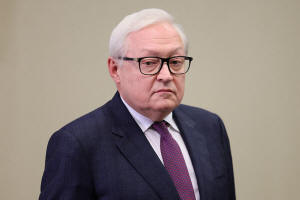Russia denies U.S. charge that it put anti-satellite weapon in space
 Send a link to a friend
Send a link to a friend
 [May 22, 2024]
By Guy Faulconbridge [May 22, 2024]
By Guy Faulconbridge
MOSCOW (Reuters) -Russia's top arms control diplomat dismissed as "fake
news" on Wednesday an assertion by the United States that Russia had
launched a weapon into low-Earth orbit that was capable of inspecting
and attacking other satellites.
The Kremlin has flatly denied assertions by U.S. officials that Moscow
is developing a space-based anti-satellite nuclear weapon.
U.S. Space Command on Tuesday pointed to the launch earlier this month
of a Soyuz rocket from Russia's Plesetsk launch site, saying it likely
involved "a counterspace weapon presumably capable of attacking other
satellites in low Earth orbit".
Russia's defense ministry said the May 17 launch had a spacecraft on
board but gave no details what it was for.
"I don't think we should respond to any fake news from Washington,"
Russian Deputy Foreign Minister Sergei Ryabkov was quoted as saying by
the Interfax news agency.
"The Americans can say whatever they want but our policy does not change
from this," said Ryabkov, adding that Moscow had "always consistently
opposed the deployment of strike weapons in low-Earth orbit".

President Vladimir Putin and then-defense minister Sergei Shoigu denied
U.S. assertions in February that Russia was developing a space-based
anti-satellite nuclear weapon designed to disrupt everything from
military communications to phone-based ride services.
U.S. Space Command said the May launch, which it dates as May 16,
included COSMOS 2576, a type of Russian military "inspector" spacecraft
that U.S. officials have long said exhibits reckless space behavior.
INTERNATIONAL LAW
Kremlin spokesman Dmitry Peskov declined specific comment on the U.S.
assertion but said Russia acted in full accordance with international
law.
[to top of second column]
|

Russian Deputy Foreign Minister Sergei Ryabkov attends a
meeting chaired by Russian President Vladimir Putin on operational
issues, including the course of Russia-Ukraine conflict and the
continuing conflict between Israel and Hamas, at the Novo-Ogaryovo
state residence outside Moscow, Russia October 16, 2023. Sputnik/Gavriil
Grigorov/Pool via REUTERS

"We are not violating anything. We have repeatedly advocated a ban
on the deployment of any weapons into space. Unfortunately, our
initiatives were rejected, including by the United States," Peskov
told reporters.
U.S. intelligence agencies had been expecting the launch of COSMOS
2576 and informed allies of their assessment of the satellite before
its deployment in space, according to a U.S. official familiar with
the intelligence. The launch also included civilian satellites
deployed to different orbits.
COSMOS 2576, as of Tuesday, has not gone near a U.S. satellite, but
space analysts observed it to be in the same orbital ring as USA
314, a bus-sized NRO satellite launched in April 2021.
Ryabkov said Russia's space program was developing as planned,
including tasks aimed at strengthening defense capability but added
that "this is also not news".
He said the United States was wrong to have dismissed Russian
proposals on strengthening the security of space activities,
including a proposal on developing a treaty on preventing an arms
race in space.
(Reporting by Reuters; Writing by Guy FaulconbridgeEditing by Andrew
Osborn and Gareth Jones)
[© 2024 Thomson Reuters. All rights reserved.]This material
may not be published, broadcast, rewritten or redistributed.
Thompson Reuters is solely responsible for this content.
 |